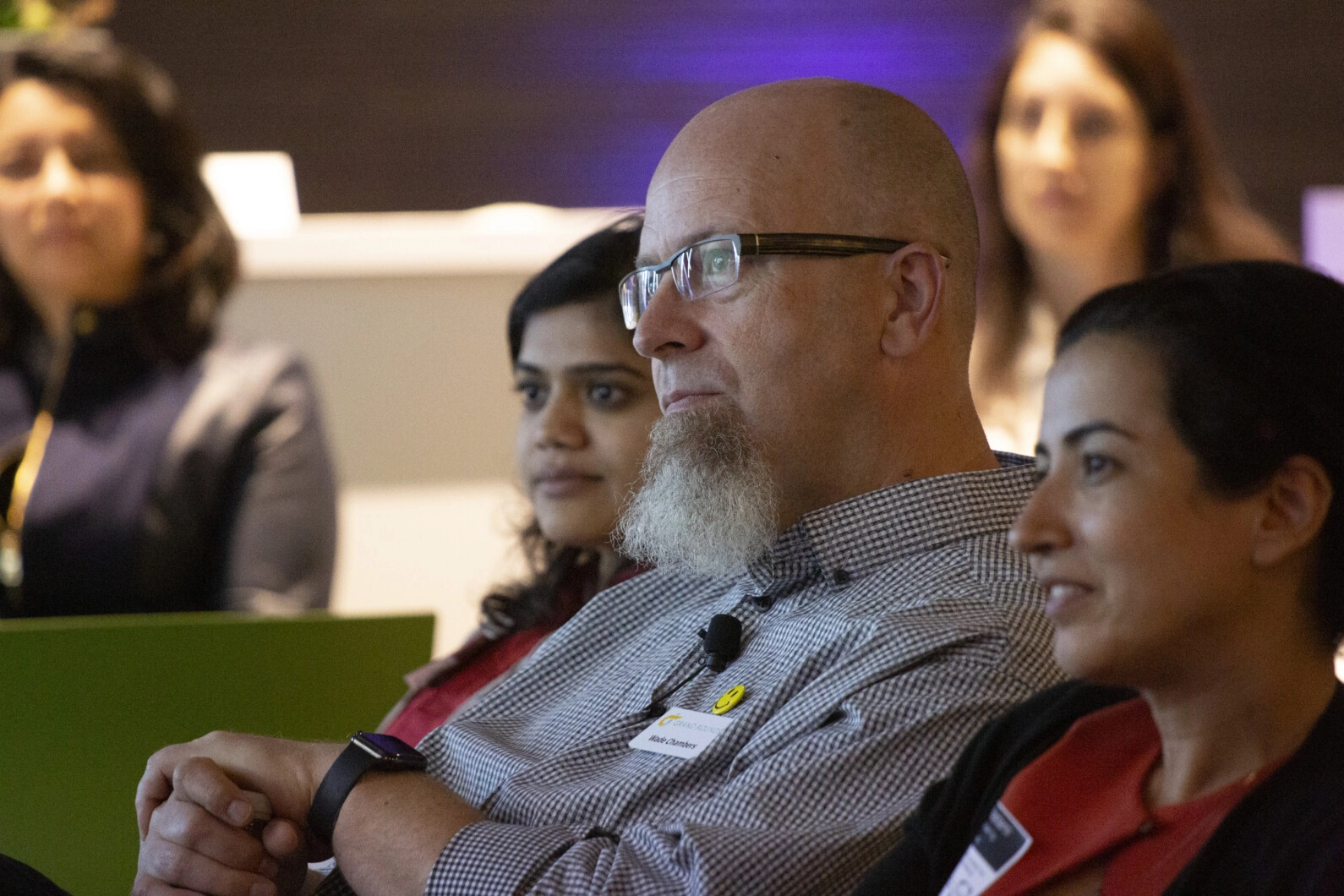Part 1: On Leadership & Teams
The transition from software engineer to a leadership role doesn’t happen overnight. Managing projects, coaching, and clearing roadblocks for team members requires different skills than writing beautiful code. But for some people, leadership is a calling. Wade Chambers is one of those people.
A legend in the Bay Area tech community, Wade has held just about every job title from software developer to his current role as our Chief Technology Officer. Co-workers describe him as thoughtful, personable, thorough, and focused on the greater good. Profoundly shaped by early experiences and mentors including tech entrepreneur Ben Horowitz, as well as national leaders in Washington, DC, Wade leads with purpose. This two part blog series offers a glimpse into the engineering principles that drive him and his team.
You served at the White House early in your career. How did that experience influence your approach to leadership and managing teams?
I was nineteen when I started working in the White House Situation Room as part of the National Security Council. I served during the Reagan Administration, at a time of historical significance. I was surrounded by people who applied their intelligence daily to real, meaningful problems. My experience there taught me two lessons about leading teams. One, make time to genuinely get to know, understand, and coach members of your team. Two, make decisions based on clearly assessing the expected value of an investment or path forward.
I was struck by how the most influential people made the time for—and deeply cared about—connecting with everyone around them. Colin Powell, a four-star general, Chairman of the Joint Chiefs of Staff, had the uncanny ability to make you feel valued. He’d come into a room and literally talk about anything, showing genuine interest in whatever we were working on. He also cared enough to tell you what he truly believed and why. He didn’t mind creating an uncomfortable situation if he thought it would improve the chance of mission success or if he thought it would improve you as a person. This made a dramatic impression on me. It gave me permission to show people I care about them personally and professionally, and ask questions to more deeply understand and respect their ideas and growth.
My other major take-away was the importance of alignment, focusing on what needs to be done, and why, to make the best decisions. Not a single action was pursued without clarity around what success looked like. We understood the key decisions that needed to be made, the probability of a positive or negative outcome, what we could do to improve the likelihood of a positive outcome, and the downside impact if we did or did not take a specific action. We learned to research and map out our options, connect with other people to assess both truth and likelihood of success, and come back with an informed point of view on how to proceed. This framework for assessing the highest expected value outcomes informs the way my teams work today. We determine which strategies and activities to invest in and how to balance risk and opportunity. And if they want to propose an idea, everyone on my team knows to come prepared with their research findings and a rationale for their recommendations.
“Making time to genuinely understand and coach members of my team and informing decisions based on highest value assessments are key components of my leadership approach.”
Everyone who knows you, knows you to be a deeply principled leader. In leading your team, what principles create the foundation for how you operate together?
There are three operating principles we constantly reinforce and celebrate across the Engineering, Product and Design (EPD) team.
- Impact over progress. Everybody wants to make progress. We want to be moving towards a better place. But how many times have you been working on something when you came up with an idea that would have made your work more impactful? An idea that would have benefited your customer or the business 10X over the thing that you were working on? We don’t want to miss those opportunities. We want to make sure that everyone in the organization—when they see a better way of doing something that could make an even bigger impact for our members, clients or team—feels it’s not just their option, it’s their obligation to raise it. We value changing our members’ lives more than hitting a specific deadline.
- We over me. I want people to be focused on themselves, find their mentors and continually expand their skills and strengths. But personal growth shouldn’t come at the expense of the team. The value of a high-performance team is much greater when team members focus on results and hold each other accountable. The essence of ‘we over me’ is to bring your best to everything that you work on, to bring others with you, to identify the things that get in the way of progress or impact, and to focus on building a better version of the team.
- Doing over knowing. Too many people focus on having knowledge as opposed to doing something with that knowledge. I want people on our team who are eager to acquire knowledge for the express purpose of producing something with it. The people who will engage in discomfort and do the work of not only acquiring the knowledge but also doing something with it (not just talking about it), are far more valuable and fun to work with.
“‘Impact over progress,’ ‘we over me,’ and ‘doing over knowing’ are at the core of everything that we do.”
People say you demand the highest performance from yourself and others. What are some of the influences that shaped your leadership style?
I think about leadership in two dimensions: the ability and the purpose of influence. When a person has a high ability to influence, and the purpose of that influence is to deliver benefits outside themself, I consider that person to be a leader. If you can get people to buy into your vision and change their beliefs and behaviors, you have the ability to influence. But then, do you benefit from that influence or does the team benefit? Does the organization? Does the company? Does the country? My experience with the President and General Powell showed me their motivation was not for personal glory. They were trying to enact change for something greater than themselves. That’s leadership.
After leading many teams and companies—Opsware, Yahoo, Proofpoint, Tellapart, Twitter—through major market-defining innovations, what inspired you to join Grand Rounds (now building a new company with Doctor On Demand and Included Health)?
After ad tech and social media, I started to think more seriously about leaving the world a better place than I found it. The industry I thought was most ripe for disruption was healthcare.
The data is coming online now, and with it, enormous potential. Innovative technology can give us superpowers—to process and create insights with that data, build platforms which take out latency, waste, and cost, and find insights that can help clinicians and care coordinators consistently deliver effective care. These data insights give us the ability to predict or detect what a member might need and proactively recommend a better path forward. Much like Moore’s Law with hardware, we’re going to see a systematic rate of change happen around healthcare technology, allowing us to improve healthcare outcomes more cost-effectively—with higher member satisfaction—than ever before. It’s going to be dramatic.
“The creation of new healthcare experiences and the platforms that facilitate care in a tech-enabled system are going to make a difference to millions, potentially hundreds of millions, of lives.”
The people are another amazing strength our company has going for it. Spend any time with our team and you’ll find a bunch of humble, hungry, smart people—both people-smart and problem-smart. When you have the ability to get to intellectual honesty on hard problems and solutions, with team members like we have, it’s fertile ground for innovation.
Do you want to build a feature? A product? A company? An entire ecosystem? Our new company will be the company that brings everything together: ensuring patients get great care in the way they prefer, removing unnecessary cost, and improving health-related outcomes.
Are you ready to tackle these challenging problems and create the solution that makes healthcare better for everyone? Are you ready to work for a deeply principled and caring leader and join a team that’s aligned around this bold mission? Check out our open roles today. We’re hiring!
About the author
Editorial Team
Our Editorial Team is composed of our leaders, clinicians, and care coordinators, as well as other Included Health employees, all who are working to raise the standard of healthcare for everyone. Together, they combine decades of subject matter experience across all fields of healthcare.



